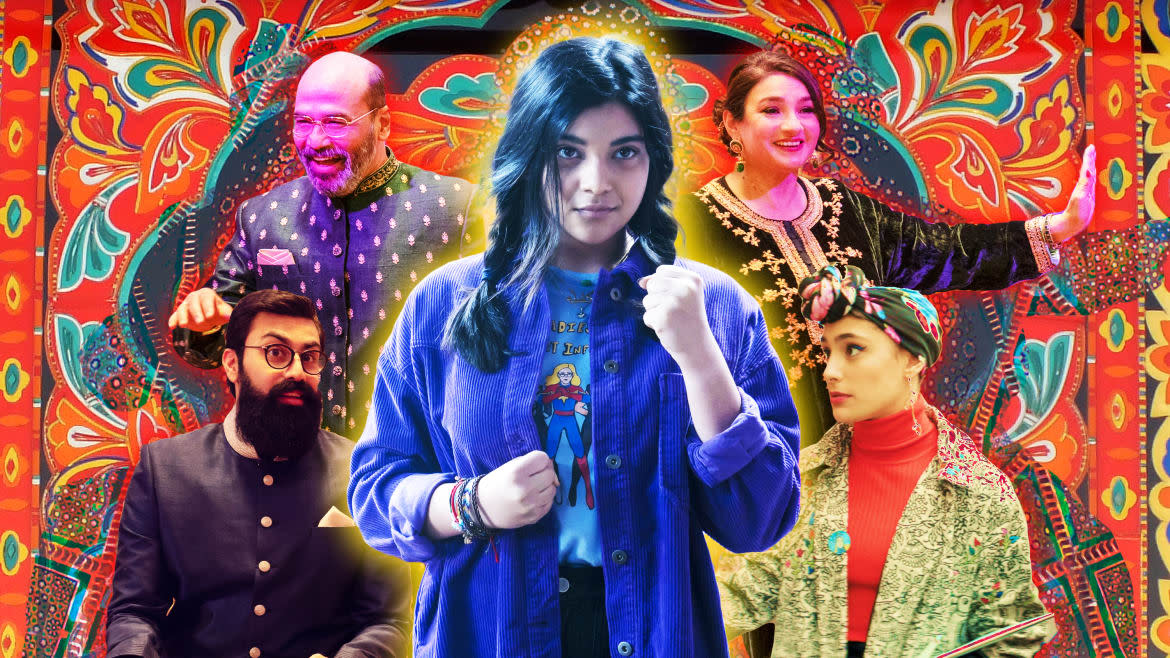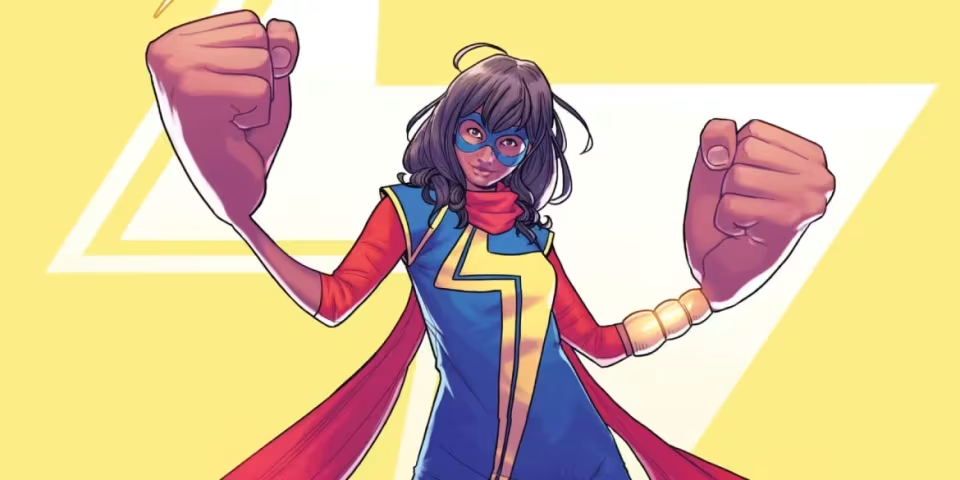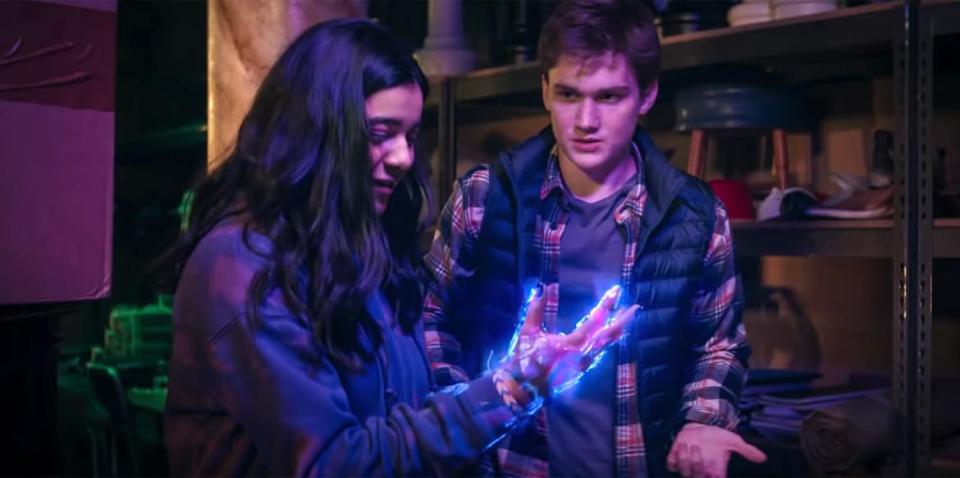The MCU’s Biggest ‘Ms. Marvel’ Tweak Undoes a Powerful Story on Race

When Marvel Studios made its proper entrance into the film business with 2008’s Iron Man, it seemed committed to staying true to Marvel characters’ origins—at least initially. After he’s wounded by shrapnel from his own missile, Tony Stark sets to work as Iron Man to keep his weapons from falling into the wrong hands. Thor Odinson learned humility when he was stripped of his powers and exiled to Earth. Steve Rogers then swung onto the scene as Captain America to take down Nazis in a similar fashion to his 1941 comic book debut.
It wasn’t until 2014’s Guardians of the Galaxy that the Marvel Cinematic Universe (MCU) deviated radically from the comic books. Despite appearing in a few major comic events, the Guardians didn’t hold much cachet with general audiences—making them the perfect test case for Marvel Studios (and its new owner, Disney) to gauge just how much their audiences cared about sticking to the source material. Rather than a competent group of heroes that united to proactively deal with major threats, the MCU’s Guardians are a ragtag group of outlaws, whose initial incentive to collaborate was a common genocidal enemy.
‘Ms. Marvel’ Proves That Marvel’s TV Shows Are Now Way Better Than Its Movies
When the movie came out, my fellow middle schoolers—who’d never heard of the team—questioned what kind of superheroes would recruit a talking raccoon and a walking tree. But sure enough, Guardians won over viewers by successfully uniting the team in their first outing without spending three years fleshing them out individually. Since then, Marvel has taken more liberties with its storytelling, to varying degrees of success—such as with 2017’s acclaimed Thor: Ragnarok and 2021’s panned Eternals. Based on this more liberal approach to their adaptations, it appears that Marvel’s learned that people don’t really care if their content sticks to the source material–until they do.
The latest entry in the MCU to differ from the comics is Disney+’s Ms. Marvel, which gives its Pakistani American protagonist Kamala Khan a new set of superpowers. Instead of gaining shape-shifting abilities through exposure to a DNA-altering vapor called the Terrigen Mists, MCU Kamala can manipulate light to create objects, like weapons and platforms by wearing a bangle that’s been passed down in her family.
In the comics, Kamala has faced a multitude of threats with her polymorphic abilities, ranging from killer robots in her hometown of Jersey City, New Jersey, to the time-traveler Kang the Conqueror. And she’s become hugely popular with real-life fans while doing it: numerous volumes of her solo series landed on the New York Times bestseller list within their first year on the market, and Kamala quickly achieved one of Marvel’s highest honors: becoming an Avenger. That level of recognition begets another big one, this time off the page and on the screen. In May 2018, Disney announced that Ms. Marvel would become a Disney+ show, which finally premiered earlier this month.
With Kamala’s level of popularity and publicity, it only makes sense that fans were watching closely to see how her story would translate onto TV. Which is why it’s no surprise that their eyebrows rose when Kamala’s MCU entrance came with a new backstory, in which her powers derive from a bangle that was passed down in her family.
Fans on social media have speculated as to what inspired the power change. One theory that’s become particularly popular is that the MCU didn’t want Kamala and the Fantastic Four’s Reed Richards to have similar powers ahead of the upcoming Fantastic Four movie. (This idea was recently dispelled by Kamala’s co-creator Sana Amanat in an interview with The Direct.)
But Marvel Studios president Kevin Feige maintains that the MCU isn’t “an exact translation of the comics,” as he said in a recent interview. He also explained in the same interview that the true nature of Kamala’s powers would be developed further in 2023’s Captain Marvel sequel, The Marvels. How her powers will develop until then remains to be seen. But no matter what happens, this initial change is a major one: it erases a major element of her origin story in a way that demonstrates their reluctance to confront real issues.
In both the Ms. Marvel show and comics, Kamala is experiencing an identity crisis. Torn between the cultures of her traditional Pakistani family and her more free-wheeling American peers, she takes comfort in her idolization of superheroes to detach from her day-to-day life. Her favorite hero is Carol Danvers (Captain Marvel), who once saved Kamala from the comic’s version of Yon-Ragg and helped save the world in Avengers: Endgame. Kamala looks up to Carol as a role model; she’s a strong, independent woman who charts her own path, just as Kamala wishes to become. But while the show frames Kamala’s idolization for Carol as fannish—the same way young girls might’ve idolized Wonder Woman or Captain Marvel after watching their respective films—the comic emphasizes that a substantial part of Kamala’s idolization of Carol extends from the fact that Carol is white.

Ms. Marvel (Kamala Khan) in the comic books.
In a scene from the comics, Kamala sees Carol in a vision as she is transforming into her super-powered self. She uses the opportunity to talk to her favorite hero, voicing her frustration with who she is and who she wants to be. Kamala wishes she were “beautiful, awesome, butt-kicking, and less complicated,” all traits that she directly equates with being Carol. Kamala immediately receives her wish, emerging from her transformation as the spitting image of Carol from her own Ms. Marvel days, sporting the Warbird costume with white skin and blonde hair.
Yet even as she gets exactly what she asks for, Kamala still doesn't feel as confident or beautiful as she imagined she would. Part of this is shown through the character of Zoe, a popular, blonde, white girl who bullies Kamala in bigoted ways throughout the second issue. Her insults are blatantly Islamophobic, ranging from implying that Kamala’s friend Nakia might’ve been forced to wear her hijab to running away from Kamala at a party, complaining that she smells like curry.
It’s after that party that Kamala acknowledges that her idolization of whiteness is only internalized racism. Although Kamala initially defends Zoe’s actions—in part because she also represents Carol’s carefree lifestyle— she can’t ignore how badly her bully actually makes her feel. Struggling to control her new powers as she tries to make it back home afterward, she runs into Zoe. Her powers react accordingly: as soon as she sees Zoe, Kamala assumes her Carol-like form, as she feels like she has to be a different person—a cooler person—around her bully. But she ultimately reverts to her true appearance and then shrinks down, admitting to herself that Zoe makes her “feel small.”
The scene makes it clear that Kamala’s idolization of whiteness (and the privilege it grants) is what motivates her at first. But that desire is also what frustrates her, even as she tries to mask the true nature of her frustration by blaming it on her family’s Muslim traditions. She doesn't really hold her culture in contempt; what she hates is that her peers are too ignorant to learn about it and too insensitive to respect it. That’s what leaves her ostracized from them, and that’s what leaves her wanting to be more like them—not less like herself.
So far, however, the show omits these crucial nuances. Zoe is still a bully but without the racism, throwing dodgeballs at Kamala’s face when she's distracted in gym class. And while Kamala still idolizes Carol, her participation in the Captain Marvel cosplay competition at AvengerCon doesn't compare to her assuming the form of a white woman because she can’t see herself as a superhero otherwise.

Kamala Khan (Iman Vellani) tests out her powers (alongside her friend Bruno, played by Matt Lintz) in the Ms. Marvel TV show.
The problem isn’t that the MCU’s version of Kamala doesn’t appear to face racism or Islamophobia in the same explicit ways that she does in the comic books. For example, her family discusses their experience living under Partition—when the British Empire cut India into two different nations—and how colonialism deeply impacted the Khans for generations. But the trauma of Partition is the most prominent example the show gives of how white supremacy affects them and, in turn, Kamala. The family doesn't talk about, say, 9/11 and the increase of Islamophobia it engendered, which continues to exist in the country. Kamala isn't given many modern touchpoints to refer to in terms of the actual material impact of the white majority's oppression. It's something that affected her parents when they were her age; that is in the past, and her present is concerned with other issues.
By downplaying this backstory’s modern reverberations in Kamala’s life, the show becomes just the latest MCU entry to shy away from the social issues that otherwise affect her. Like Tom Holland’s Peter Parker before her—the one who rose out of his canonical poverty thanks to Tony Stark—the MCU’s Kamala has other enemies to face.
‘Ms. Marvel’ Creator on the Right-Wing Backlash to Her Muslim Superhero and Remixing Wonder Woman
It’s hard not to feel cynical about the decision not to replicate these parts of Kamala’s story on-screen. Considering that Ms. Marvel is the only Marvel TV show to feature a female lead of color thus far (and the only one to be review-bombed after its release), this creative decision feels as though Disney avoided depicting this conflict in the show, as to not make white audiences uncomfortable.
Perhaps Ms. Marvel’s viewers—and its makers—would benefit from watching Amanat recount her experiences growing up in New Jersey as a Pakistani-American. They’d easily see just how strongly the comic book version of Kamala’s struggles are lifted directly from her own: from the temptations of BLTs to the ostracization she faced after 9/11, Kamala is her reflection. Not only was the comic books’ Kamala meant to offer readers a hero who shared their struggles to find themselves, but she also was to do it with a sense of pride in her heritage. If Kamala’s origin offers any lesson to readers, it’s that sometimes it takes confronting your issues directly to change for the better. The MCU ultimately facilitates the existence of white supremacy and the other social issues it refuses to address by pretending that they’re no longer as relevant to the character as they were in the comics.
Get the Daily Beast's biggest scoops and scandals delivered right to your inbox. Sign up now.
Stay informed and gain unlimited access to the Daily Beast's unmatched reporting. Subscribe now.

 Yahoo Movies
Yahoo Movies 
